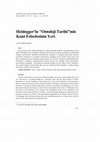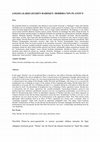Papers by Çetin Türkyılmaz
Bu yazida Hegel’in, Spinoza tersine Leibniz’in felsefede oznellik ve bireysellik alanini actigi y... more Bu yazida Hegel’in, Spinoza tersine Leibniz’in felsefede oznellik ve bireysellik alanini actigi yonundeki iddiasindan hareket ediyorum. Leibniz’in felsefe tarihindeki oneminin ozellikle bu noktaya dayandirilmasinin ne olcude hakli oldugu sorunundan hareketle de, Leibniz’de “tek olan”in, bireysellesme, tekillik ve monad kavramlari cercevesinde hesaba katilmasi gerektigini ortaya koymaya calisacagim; bu anlamda da, Deleuze’un Leibniz yorumundan da faydalanarak, bu bireyselligin fark ve cokluk alanina olanak saglayan “olay” dusuncesiyle birlikte dusunulmesi gerektigini iddia edecegim. Ote yandan, Leibniz’in felsefe tarihindeki asil oneminin, onun tek olani hesaba katarken, bunu bir guc, degisim ve gelisim cizgisi cercevesinde yapmasindan kaynaklandigini gostermeye calisacagim.

H.Ü. Edebiyat Fakültesi Dergisi, 2004
Özet Bu çalışmanın amacı, Martin Heidegger'in "ontoloji/metafizik tarihinde" Kant felsefesinin ye... more Özet Bu çalışmanın amacı, Martin Heidegger'in "ontoloji/metafizik tarihinde" Kant felsefesinin yerinin nasıl belirlendiğini ortaya koymaktır. Heidegger Kant'ın temel sorununun metafiziği te-mellendirmek olduğunu söylemektedir. Metafiziği temellendirmek, ontolojinin iç olanağının gösterilmesi anlamına gelmektedir. Ontolojinin iç olanağının aydınlatılması, Heidegger'e göre, Kant'ta varolana aşkın olan aklın saf bilgilerinin ortaya konmasıyla gerçekleştirilir. Bu, ona göre, ontolojinin temellendirilmesidir. Ontolojinin iç olanağının aydınlatılmasında temelde yeralan yeti, ontolojik sentezi gerçekleştiren transsendental imgelemdir. Transsendental imgelemin zamanla içsel bir ilişkisi vardır. Heidegger'e göre, Kant koyduğu bu temel önünde daha sonra geri çekilmiştir. Bunu yapmakla o, varlığın zamanla olan ilişkisi sorununu eksik bırakmıştır. Abstract The aim of this study is to expose how Martin Heidegger gives place to Kant's philosophy in his own "the history of ontology/metaphysics". Heidegger states that the main problem of Kant's philosophy is to lay the foundation of the metaphysics. Laying of the foundation of the metaphysics means to realize the projection of the intrinsic possibility of ontology. The Projection of the intrinsic possibility of ontology in the Kant's philosophy is realized, in accordance with Heidegger's view, when Kant presents the pure knowledge of reason which is transcendent to the being. For Heidegger, this is the laying of the foundation of the ontology. The fundemantal faculty in the realization of the projection of the intrinsic possibility of ontology is the transcendental imagination which produces the ontological synthesis. The faculty of the transcendental imagination has an intrinsic relation with time.
Temâşâ Felsefe Dergisi, 2015
Kutadgubilig Dergisi, 2016

Synthesis Philosophica, 2018
I argue that to understand Hegel's critique of Stoicism in relation to the problem of freedom it ... more I argue that to understand Hegel's critique of Stoicism in relation to the problem of freedom it is important to appreciate some Foucault's ideas and those of the Foucauldian circle influenced by his thought. I will begin by discussing Foucault's reference to Greco-Roman Philosophy in his lectures at Collège de France. In those lectures, by using Hadot's concept of spiritual exercises, he tries to constitute ethics of the self based on a conception of subjective freedom. Afterwards, I will deal with Hegel's critique of Stoicism on the ground of the Stoic theory of oikeiōsis. Hegel's interpretation of this theory is the basis of his critical attitude towards Stoicism. There is a connection between Stoicism and Foucault's late period in respect to the conception of freedom, which is entirely based on subjectivity. At the end of this paper, I hope to show that Hegel's critique of Stoic ethics, beginning with an examination of the theory of oikeiōsis, can provide us with an opportunity to criticise the subjective point of view in the problem of freedom.

Hacettepe Üniversitesi tarafından Hacettepe Üniversitesi Basımevi'ne 250 adet bastırılmıştır. May... more Hacettepe Üniversitesi tarafından Hacettepe Üniversitesi Basımevi'ne 250 adet bastırılmıştır. Mayıs 2019 Kültürel Bellek Sunuş iii Hacettepe Üniversitesi Tarihi ve Kültürel Mirası Araştırma Merkezi HÜTKAM olarak kültürel bellek çalışmalarına katkıda bulunmayı görevimiz kabul ediyoruz. 2016 yılında, yönetim kurulu olarak bu serüvene başlamaya karar verdik. Güvendiğimiz dostlarımız, arkadaşlarımız ve elbette hocalarımız çağrımızı yanıtsız bırakmadı. Birbirinden değerli araştırmalarla zenginleştik ve tarihe not düşmek adına kültürel bellek çalışmalarına biz de katıldık. Kültürel mirasın evrensel olduğu, oralı/buralı, sizden/bizden, uzak/yakın ayırmadan, hepimizin olduğu fikrinden yola çıktık. Bizi biz yapan, toplumları oluşturan, birleştiren kültürel belleğimizdir. Kimi zaman insan eliyle, cehaletle, yıkıcılıkla bazen adamsendecilikle, bilinçsizlikle tahrip edilen, yok edilen tarihi ve kültürel miras, belleğimizin önemli, çok önemli bir parçasıdır. Her zaman önünden geçtiğimiz bir yapı bir gecede yıkıldıysa, çocukluk anılarımızı biriktirdiğimiz mahallemiz yok olduysa, sokağımızın, meydanımızın adı değiştiyse eksiliriz. Bizi büyüten oyunlar kaybolduysa, bir tekerleme artık hatırlanmıyorsa, çocukluğumuzun sanatçıları göçmüşse, eski şarkılar plaklarda bile yoksa eksiliriz. Hafızamızı tetikleyen imgeler, kokular, sesler, tatlar değişirse bireysel belleğimiz, yaşadığımız kentin ve toplumun belleği zarar görür, eksiliriz. Bireysel tarihimizde, belleğimizdeki insanları yitirdikçe nasıl azalıyorsak tarihi ve kültürel mirası, ortak belleği yitirdikçe de öyle zayıflar ve giderek yok oluruz. İşte bu nedenle biz hatırlamayı, öğrenmeyi, görmeyi, araştırmayı seçiyoruz. Unutmamak için, unutulduysa hatırlamak ve hatırlatmak için, bilmeyenlere göstermek, anlatmak ve belleğimize sahip çıkmak için başladığımız bu serüvende çağrımızı kırmayan değerli araştırmacılara şükranlarımızı sunuyoruz. Unutmayalım ki kültürel bellek, hepimizi birleştiren güçtür.

Bu yazıda, öncelikle G. Deleuze'ün Spinoza yorumundan hareketle, Spinoza'da bilinçten ne anlaşıld... more Bu yazıda, öncelikle G. Deleuze'ün Spinoza yorumundan hareketle, Spinoza'da bilinçten ne anlaşıldığını ele alacağım; daha sonra Hegel'in Spinoza'ya yönelik eleştirilerini göz önünde tutarak, bu iki filozofun bilince ilişkin yaklaşımları bakımından bir sonuca varacağım. Deleuze'ün felsefe tarihinin, Bergson, Nietzsche gibi önde gelen kimi filozoflarına yönelik yorumlarına sıkı bir Hegel karşıtlığı sirayet etmiştir. Deleuze "tarihin rasyonalist geleneğine karşı gelen yazarlarını severek", "Hegelcilikten ve diyalektikten nefret" eder. 1 Bu nefret duygusu Deleuze'ün bütün felsefi çabası göz önünde tutulursa bir duygu olmanın ötesinde bir anlam taşır. Hegel ve Hegelcilik karşıtlığı onda, bilinçsiz olanın gücünü ortaya koymanın ve "spekülatif olumsuzlama, karşıtlık ve çelişki" düşüncesinin karşısına fark, olumlama (affirmation) ve sevinci 2 çıkarmanın bir aracıdır. 3 Deleuze'ün Spinoza yorumunu da, tıpkı Bergson ve Nietzsche'ye ilişkin yorumlarında olduğu gibi, onun Hegel karşıtlığı temelinde değerlendirmek gerekir. Bu yorumda, fark, olumlama ve sevinç, Spinoza'nın bedene yaptığı vurgunun Deleuze tarafından öne çıkarılmasıyla ve beden karşısında bilincin güçsüzlüğünün (ya da bilinçsiz olanın gücünün) dillendirilmesiyle anlam kazanır. 4 Deleuze, öncelikle, Spinoza'nın değer verilen bir filozof olmasının yanında, aşağılanıp nefret edilen bir filozof olmasına dikkat çekmektedir. 5 O Spinoza'dan nefret

This article deals with philosophical dimensions of various ideas in Sheikh Bedreddin's work Vari... more This article deals with philosophical dimensions of various ideas in Sheikh Bedreddin's work Varidat in relation to those of various currents of thought that are claimed to underlie Bedreddin's work. First, Neo-platonist notions that are presumed to underpin Sheikh Bedreddin's views will be presented with reference to Plotinus and Sühreverdi's works, before pointing at several critical points that distinguish Varidat from the neo-platonist philosophy. At first, the basic difference between Bedreddin and Neo-platonism is based on a thought according to which a body that is a manifestation of God is never be "evil". Besides, contrary to Sühreverdi's view, Bedreddin wants to get rid of all transcendent conception of being in his thought. Secondly, considering those claims that Bedreddin was influenced by the Hurifi thought and materialism, the materialist standpoint (Dehrîyyun) represented by İbn Ravendi, and El-Maarri will be discussed to show how Bedreddin's vision ties in and also differs from it. Bedreddin's basic difference from materialism (Dehriyyun) stems from a fact that he asserts a mystical conception of being whereas materialism is based on a rationalist perspective in which all things can be explain in a rational way. In contrast to the messianic understanding of Hurufism, for Bedreddin such messianic inclinations and hopes are not important in respect of Sufi thought. Thirdly, Sheihk Bedreddin will placed at midway between the philosophies of İbn Arabi and Spinoza, and Sheikh Bedreddin will be argued to stand closer to Spinoza. On the other hand, it will also be argued that Sheikh Bedreddin departs from Spinoza particularly in terms of methodology. In conclusion, it will be claimed that Sheikh Bedreddin's Varidat can be considered an anomaly as it stands apart from those all those views despite its resemblances.

Özet Bu çalışmada Platon'un, metafiziğin sonu düşüncesi çerçevesinde Nietzsche ve Heidegger'i tak... more Özet Bu çalışmada Platon'un, metafiziğin sonu düşüncesi çerçevesinde Nietzsche ve Heidegger'i takip eden Derrida tarafından nasıl ele alındığına değinildi. Mitos'tan logos'a doğru gelişen bir hareketle, logos'un belirleyiciliğinde mitos'tan kopan düşüncenin başlangıcı Platon, sonu ise Hegel olarak nitelendirilir. Bu başlangıç ve son ilişkisi çerçevesinde metafizik düşünme biçimini aşmaya çalışan Nietzsche ile Heidegger'den farklı olarak Derrida, bu düşünme biçiminin aşılamayacağını, bu düşünme biçiminin bizi getirdiği kriz aşamasında bir süreklilik olduğunu düşünür. Metafizik düşünme biçiminde belirleyici olan ise, ikili karşıtlıklar sistemidir. Duyulur-düşünülür, aşkın-içkin, iyi-kötü, mitos-logos gibi ikili karşıtlıkların felsefenin en başından bu yana, hep bir sorunsal yapıya işaret ettiğini, Derrida Platon'un çeşitli metinlerini ele alıp, yapıbozuma uğratarak göstermek istemektedir. İlkin Phaidros diyalogundaki pharmakon meselesi, daha sonra da Timaios diyalogundaki khôra meselesinden hareketle Derrida, Platon'un kendi metninde de bu karşıtlıklar sisteminin " istikrarsızlaştırıldığı " nı ve karşıtlıklar arasındaki bir uçurumu, aradalığı kendinde taşıdığını ortaya koymuştur. Bu nedenle Platon ve Platon tarafından imzalanan metnin bir etkisi olarak kendini gösteren tüm felsefe, görünürdeki sağlam temellerinin ötesinde, hep bir " söylenmemiş olarak kalanın " sarsıcı etkisini kendinde taşımaktadır. Derrida'nın Platon'u yorumlayışını kendisine konu edinen bu çalışma ise, sonunda, Nietzsche, Heidegger ve Derrida tarafından ortaya konan bu hattın kendisinin de sorunsallaştırılabileceğini ortaya koyarak, Platon'un başlangıçtan bu yana felsefenin ve düşüncenin " temel meselesi " olduğu sonucuna varmaktadır. Abstract In this paper, Derrida's way of considering Plato is touched on, who follows Nietzsche and Derrida within the scope of thought at the end of metaphysics. Plato is characterised as the beginning of thought which breaks out the mythos on deciveness of logos, by a movement progressing from mythos to logos. On the other hand, Hegel is characterised as the ending of this thought. Unlike Nietzsche and Heidegger, who always try to overcome the metaphysical way of thinking in respect of the relation of these beginning and ending, Derrida thinks that it is impossible to overcome this way of thinking and that it is a continuity during the crisis phase in which the man was taken by itself. The determinant of metaphysical way of thinking is binary opposition system. Derrida tries to demonstrate that the binary oppositions like sensible-intelligible, transcendent-immanent, good-evil and mythos-logos have indicated a problematic structure since the very beginning of philosophy, on several texts of Plato by deconstructing them. Firstly by pharmakon argument of Phaidros and later on by khôra argument of Timaios; Derrida reveals that the binary oppositions system has been " destabilised " in Plato's own text as well and that his very text carries the abyss, the in-betweenness of the oppositions within. Thus, Plato and the whole philosophy which manifests itself as an effect of Plato's signatured text, always carry a traumatic effect of " remaining unspoken " within itself, beyond its apparently unshakable basis. This paper, which mentions Derrida's interpretation on Plato, reveals that the line presented by Nietszche, Heidegger and Derrida can be also problematised; and consequently decides that Plato has been the " key issue " of philosophy and thinking from the very beginning.
This paper was published in Hegel-Jahrbuch 2015
Hegel gegen Hegel II
Herausgegeben von
Andreas A... more This paper was published in Hegel-Jahrbuch 2015
Hegel gegen Hegel II
Herausgegeben von
Andreas Arndt, Myriam Gerhard, Jure Zovko
in Verbindung mit
Önay Sözer und Alper Turken
De Gruyter Verlag (ISSN 0073-1579)
edebiyatdergisi.hacettepe.edu.tr
Hegel constituted a closed philosophical system although it is dynamic in itself. In this study, ... more Hegel constituted a closed philosophical system although it is dynamic in itself. In this study, the relation between the idea of "end" and the concept of realization in Hegel's system will be attempted to be investigated by taking Heidegger's evaluations of the relation between Hegel's concept of the Absolute and time into consideration.
Drafts by Çetin Türkyılmaz
die Dissertation Franz Brentanos, die den Titel "Von der mannigfachen Bedeutung des Seienden nach... more die Dissertation Franz Brentanos, die den Titel "Von der mannigfachen Bedeutung des Seienden nach Aristoteles" traegt, im Jahre 1907 gelesen hat, begann er sich, mit der Philosophie Aristoteles im Rahmen der Seinsfrage zu beschaeftigen. In dieser Zeit war er noch ein Student in der Theologischen Fakultaet der Universitaet Freiburg. Das Interesse für Aristoteles Philosophie ging mit der Vorlesungen weiter, die er als ein Lehrer sowohl in den Jahren 1921/22 als auch in 1929/30 und 1931 an der Universitaet Freiburg gehalten hat. In der obenerwaehnten Dissertation behauptet Brentano, dass in der Philosophie Aristoteles das Seiende (το ον) "in mehrfacher Weise gesagt" und dementsprechend in der vier Hauptsinnen gedacht wird: 1. ον κατα συμβεβηκός, 2. ον ως αληθές und dessen Gegenteil das μη ον ως ψευδος, 3. ον der Kategorien, und 4. δυνάμει και ενέργεια.
Conference Presentations by Çetin Türkyılmaz
Uluslararası İstanbul Felsefe Kongresi Bildiri Kitabı, 2018
Books by Çetin Türkyılmaz











Uploads
Papers by Çetin Türkyılmaz
Hegel gegen Hegel II
Herausgegeben von
Andreas Arndt, Myriam Gerhard, Jure Zovko
in Verbindung mit
Önay Sözer und Alper Turken
De Gruyter Verlag (ISSN 0073-1579)
Drafts by Çetin Türkyılmaz
Conference Presentations by Çetin Türkyılmaz
Books by Çetin Türkyılmaz
Hegel gegen Hegel II
Herausgegeben von
Andreas Arndt, Myriam Gerhard, Jure Zovko
in Verbindung mit
Önay Sözer und Alper Turken
De Gruyter Verlag (ISSN 0073-1579)